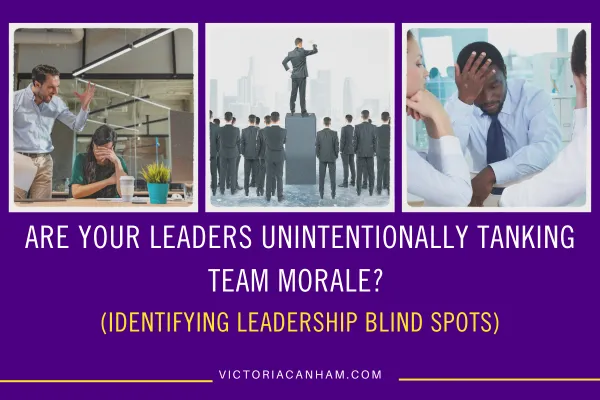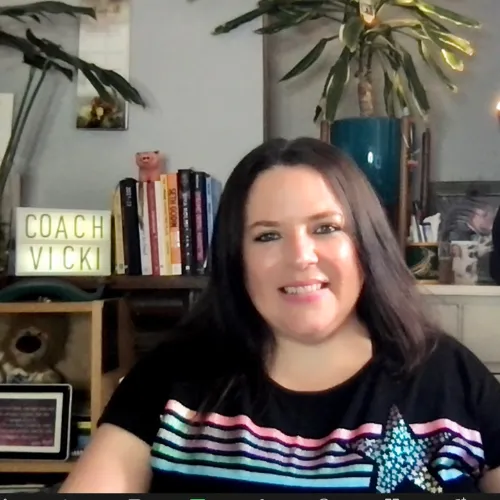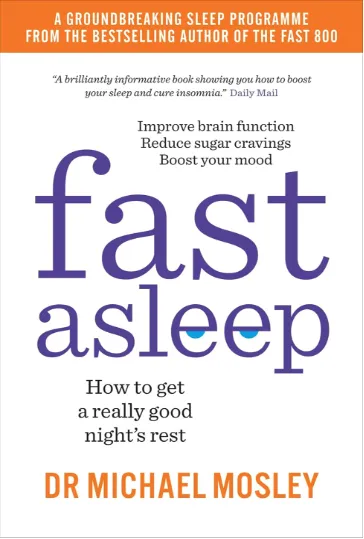Are Your Leaders Unintentionally Tanking Team Morale?
Victoria Canham • 4 June 2025 • 5 min read

"Leaders who don't listen will eventually be surrounded by people who have nothing to say." - Andy Stanley
As a leader, you pour your energy into strategy, innovation, and hitting targets. You believe you're fostering a positive environment, and your intentions are good. Yet, you might observe subtle signs of flagging morale: a dip in proactivity, quiet resistance, or a general lack of spark that you can't quite pinpoint.
The uncomfortable truth for many leaders is that sometimes, despite the best intentions, their own actions – or inactions – create significant blind spots that inadvertently tank team morale and performance.
It's not about being a "bad" person. It's about the gap between intent and impact. Your team watches everything. They see not just what you say, but what you do, what you prioritise, and how you react. And often, what they perceive is vastly different from what you assume.
The biggest blind spot? Assuming others are thinking what you are thinking.
If a leader doesn't actively lead, culture fills the vacuum. And without conscious, intentional leadership, that vacuum rarely fills with anything good.
Here are common leadership blind spots that can unintentionally tank team morale and performance:
1. The "Open Door" That Feels Pretty Closed
You say your door is always open. You genuinely believe it. But your team sees a calendar packed with back-to-back meetings, emails answered at midnight, and a perpetually stressed expression. They infer that you're too busy or that their problems are trivial. The "open door" becomes a theoretical concept, and valuable insights – or simmering frustrations – never make it to you.
How to address: Beyond declaring an open door, demonstrate it. Schedule regular 1-to-1s, explicitly ask for feedback in team meetings (and truly listen), and dedicate specific, visible "open office" or "ask me anything" slots. Prioritise active listening over always having the answer.
2. Praising Effort, Punishing Mistakes (Unintentionally)
You genuinely want your team to innovate and take risks. You offer encouragement. But how do you react when a well-intentioned risk doesn't pay off, or a new process introduces a temporary hiccup? If the unconscious reaction is frustration, blame, or even just a subtle withdrawal of enthusiasm, your team learns to play it safe. Psychological safety plummets.
How to address: Cultivate a "learning from failure" mindset. Publicly acknowledge brave efforts, even if they don't succeed. Focus on what was learned, not who was to blame. Model vulnerability by admitting your own mistakes and what you learned from them.
3. "Leading By Example" That Contradicts Values
You champion work-life balance, but you're sending emails at 11 PM. You talk about transparency, but critical decisions happen behind closed doors. You promote collaboration, but micromanage individual tasks. Your team observes these inconsistencies. When words and actions don't align, trust erodes faster than any strategy can be implemented.
How to address: Practice radical self-awareness. Ask for honest, anonymous 360-degree feedback on how your leadership style is perceived. Consciously align your daily actions with the values you espouse. Remember, people mimic what's modelled. If you’re not ready for the brutal truth, start with completing a DiSC profile to help things along.
4. Ignoring the "Subtle" Conflict or Negative Dynamics
You might prefer to focus on the big picture, assuming minor interpersonal tensions will resolve themselves. Or perhaps you're conflict-averse. However, unresolved conflict, passive-aggressive communication, or persistent negativity within a team acts like a slow-acting poison, silently corroding morale and trust.
How to address: Step into the discomfort. Address underlying tensions early and directly, but empathetically. Facilitate crucial conversations, set clear boundaries for acceptable team behaviour, and intervene if necessary to protect the psychological safety of the group.
5. Prioritising Urgency Over Importance (and People)
The constant pressure of immediate deadlines can make leaders default to a state of urgency, pushing tasks through regardless of their impact on team well-being or sustainable practices. When your team always feels like they're in crisis mode, they eventually burn out, become reactive, and lose sight of long-term goals or personal development.
How to address: Practice strategic prioritisation. Protect your team's time and focus by saying "no" to less important tasks. Delegate effectively to empower your team. Champion well-being as a strategic imperative, not just a feel-good initiative, recognising that sustainable performance comes from sustainable people.
Leaders Set the Temperature. They Shape Employee Experience.
Your team notices everything, and often, they say nothing–not because they don't care, but because they sense the fear under silence, and the safety in being invisible. If there's no psychological safety, you'll never get truth, innovation, or loyalty – just compliance and stress.
Most leaders I partner with are genuinely shocked to realise they've been a blind spot in their own team's experience. It’s a tough realisation, but it’s the critical first step towards creating a truly thriving workplace.
You don’t need a crisis to course correct. Acknowledging these blind spots is the first step toward transforming your leadership impact.
Ready to Build Clarity, Trust, and Sustainable Performance?
At Victoria Canham Consultancy, I partner with high-performing leaders who want to get out of the echo chamber and see what's really going on in their team. Through Strategic Leadership Partnership and Human-Centred Performance strategies, we help you cultivate psychological safety, foster genuine engagement, and build teams that don't just perform but truly thrive.If you're ready to proactively address these challenges and ensure your leadership aligns with your best intentions, let's connect.
✨ Let's Talk
If you're ready to support your leaders to lead better — with trust, clarity, and real human connection — let's have a conversation.I work with organisations to develop human-centred performance cultures where leadership is both strategic and relational.
✅ Culture diagnostics
✅ 1:1 executive coaching
✅ Trusted leadership partnerships
✅ EQ and psychological safety training
📩 Book a chat or send me a message — totally confidential, no salesy nonsense.
🔻
I am Victoria Canham, I transform employee journeys into competitive advantages. From frontline staff to senior leaders, I help you create a culture of respect, growth, and loyalty that drives bottom-line results.
Recommended Reading
Fast Asleep: How to get a really good night's rest by Dr Michael Mosley
A good night's sleep is essential for a healthy brain and body. So why do so many of us struggle to sleep well? In Fast Asleep, Dr Michael Mosley explains what happens when we sleep, what triggers common sleep problems and why standard advice rarely works.
Prone to insomnia, he has taken part in numerous sleep experiments and tested every remedy going. The result is a radical, four-week programme, based on the latest science, designed to help you re-establish a healthy sleep pattern in record time.
With plenty of surprising recommendations - including tips for teenagers, people working night shifts and those prone to jet lag - plus recipes which will boost your deep sleep by improving your gut microbiome, Fast Asleep provides the tools you need to sleep better, reduce stress and feel happier.
We’re not just about overcoming obstacles, we’re about transforming lives.
Book Recommendation

Victoria Canham - Performance and People Strategic Partner
Victoria Canham is an ICF-accredited Certified Professional Coach and the founder of Victoria Canham Consultancy. We are a specialist performance consultancy partnering with senior leaders and HR teams to elevate culture, leadership, and employee experience. Rooted in behavioural insight and change expertise, we diagnose what's truly holding performance back, co-creating practical, strategic interventions that drive sustainable business results and build workplaces that work—for people and performance.
Hang out with us on social media
© Copyright 2026 Victoria Canham Coaching | Website built by Me on FEA Create (aff.)
Performance Coaching Reading, London, Berkshire, Oxford | St George's Road, Reading, Berkshire, United Kingdom, RG30 2RL | +44 7377 527 529 | [email protected] Open Monday to Friday 9 am until 5 pm

